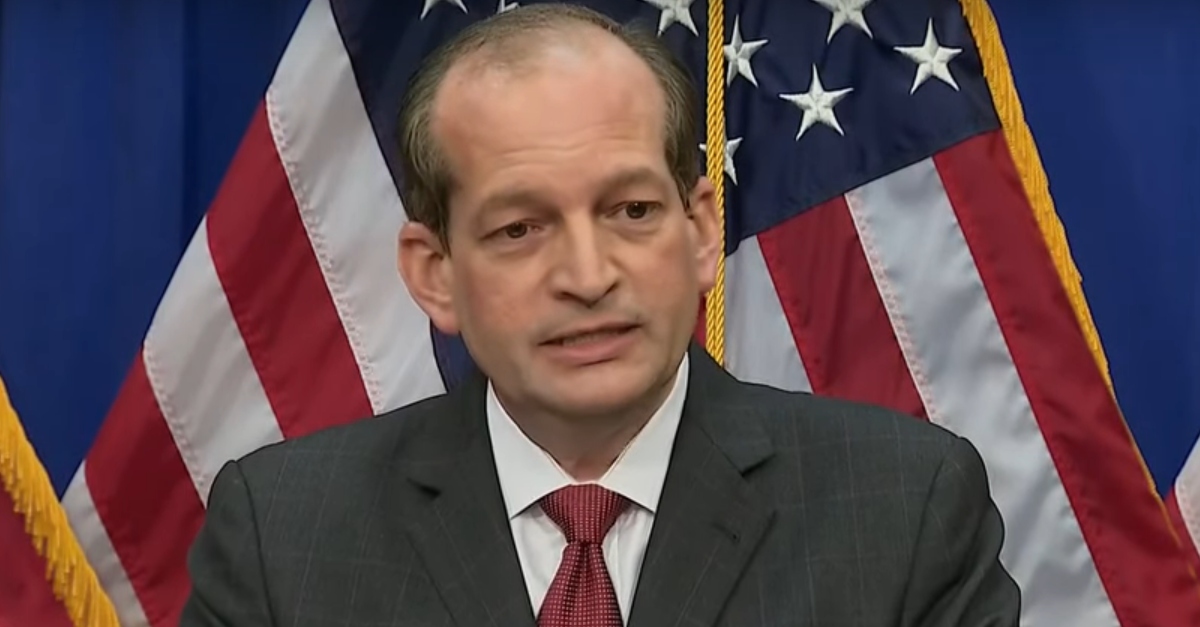
It seems like Secretary of Labor Alexander Acosta potentially handed convicted pedophile Jeffrey Epstein an argument in new federal sex trafficking case against him in the Southern District of New York.
Renato Mariotti, a former federal prosecutor and current CNN legal analyst, immediately reacted to Acosta’s remarks by saying the Labor Secretary basically teed up a future argument for Epstein’s defense team.
Why is Acosta making public comments discussing the specifics of victim’s communications with law enforcement while charges against Epstein are pending?
He can potentially use Acosta’s statements against prosecutors in that case. https://t.co/q8Vq5TnyP6
— Renato Mariotti (@renato_mariotti) July 10, 2019
Comments like this will be used by Epstein’s defense team to argue that he has been prejudiced. https://t.co/oqx8Xkr8aY
— Renato Mariotti (@renato_mariotti) July 10, 2019
Others made the same observation, noting that Acosta said earlier in the press conference that he wouldn’t comment on the pending case.
Acosta, previously a U.S. Attorney for the Southern District of Florida, reached a non-prosecution agreement, in which Epstein agreed to plead guilty in state court. In the end, the defendant only admitted to two counts for soliciting prostitution, and spent 13 months in jail–much of it in a cozy work release scenario–and had to register as a sex offender. The alleged co-conspirators also received immunity from federal prosecution. This punishment was extremely light, given Epstein’s alleged criminality. He was accused of sexually abusing and exploiting dozens of underage girls.
Victims were kept in the dark about this agreement, according to a 2018 report from The Miami Herald. A federal judge ruled in February that the government broke the law by doing this.
Acosta defended his approach in the press conference on Wednesday. He said he did it for the survivors, and argued that they would’ve faced hostile defense tactics. He also said that ensuring Epstein became a known sex offender and did time behind bars was the no. 1 priority. Ultimately, he declined to offer an apology. But his answers confused and aggravated many observers. Note the responses from Joyce White Vance, former U.S. Attorney for the Northern District of Alabama, and Mimi Rocah, a former federal prosecutor for the Southern District of New York.
This was a pretty weird answer: “I can’t address it directly because of our guidelines.” pic.twitter.com/9SVi8HNKo2
— Josh Marshall (@joshtpm) July 10, 2019
Why does #Acosta keep insisting that the goal was to put Epstein behind bars? He served 13 months on a work-release that let him go to the office six days week. That’s not a jail sentence, it’s a sabbatical.
— Mónica Rhor (@monicarhor) July 10, 2019
Acosta’s suggestion that his obligation to protect victims was somehow different 12 years ago, because of changing societal attitudes, than it would be today is ridiculous. The more he defends his conduct the worse he sounds. https://t.co/FtylKFASmj
— Joyce Alene (@JoyceWhiteVance) July 10, 2019
Acosta summary: FL was going to give a bad plea & I was the hero who swept in & gave him a slightly less bad plea because my prosecutors were too scared to go to trial & times were different then & FL did this crazy work release thing I couldn’t possibly have seen coming. 😡
— Mimi Rocah (@Mimirocah1) July 10, 2019
[Screengrab via Law&Crime Network]